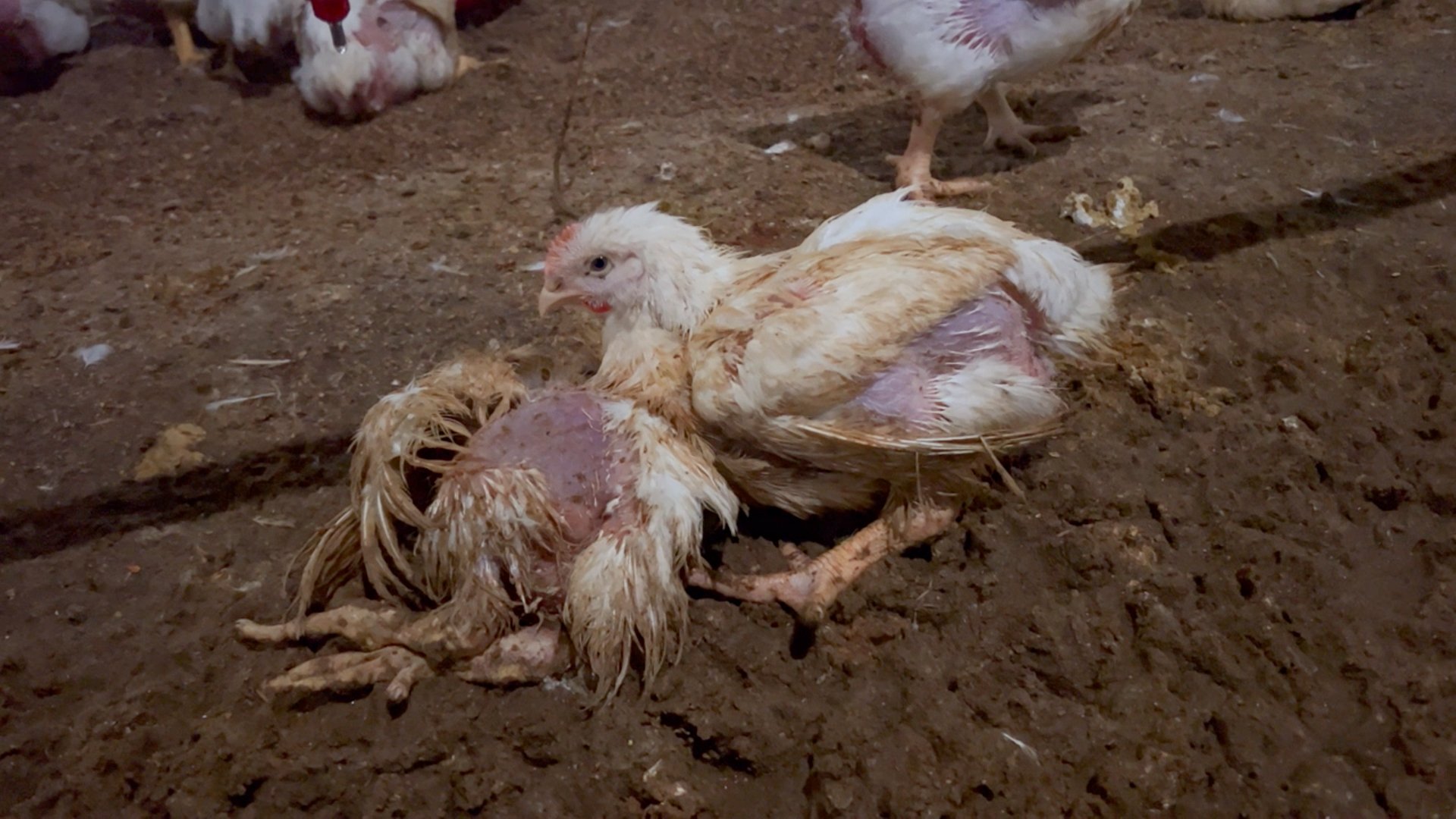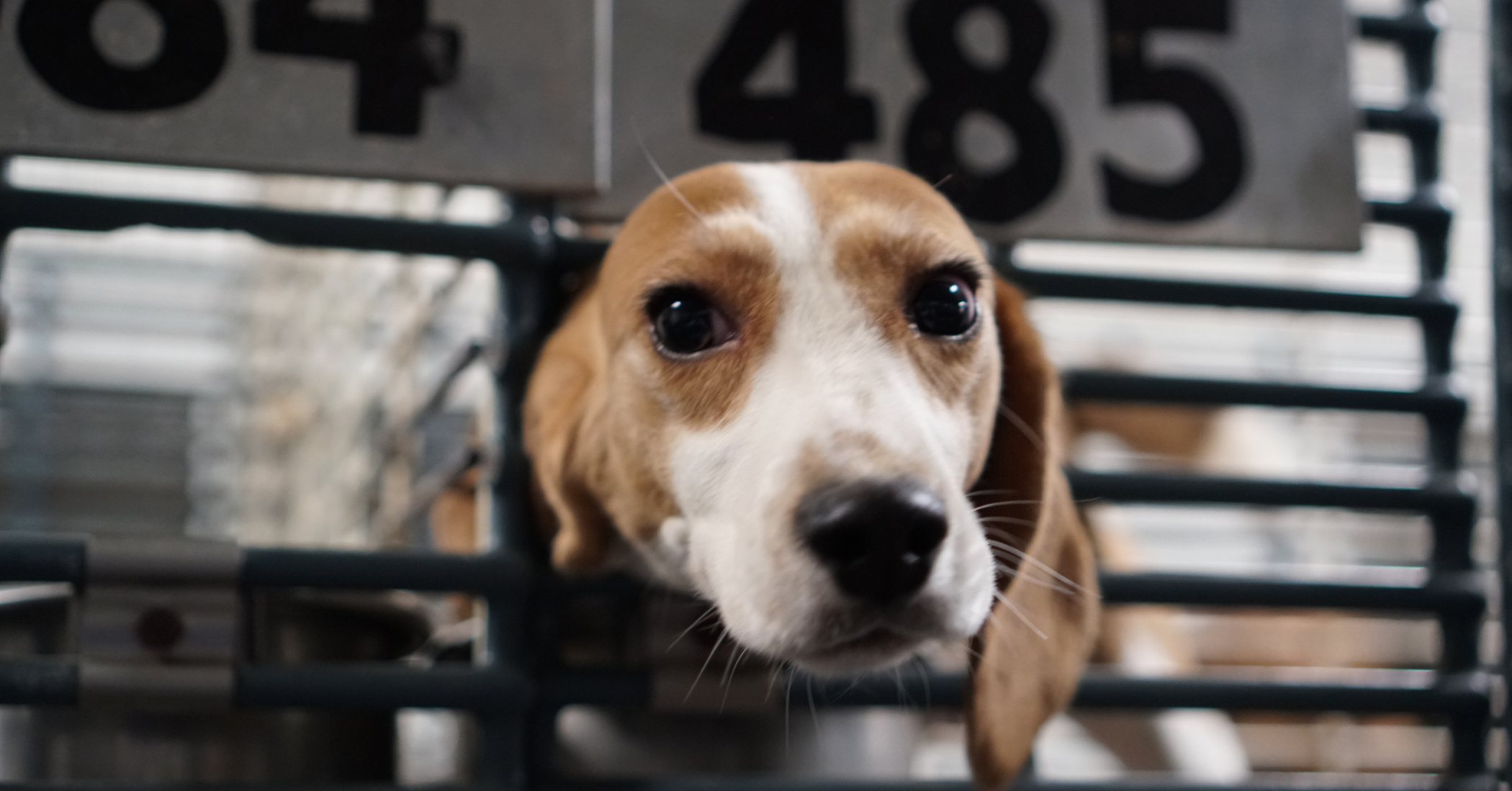'It’s Just a Living Nightmare': Tyson's Misleading Free-Range Claims Exposed
An extensive undercover investigation into Tyson Foods, America’s largest chicken producer, has revealed the systemic cruelty inherent in the industry, shining a light on the ‘myth’ of free-range.
A live chicken remains by the side of a dead chicken on the muddy ground. Credit: Animal Outlook
America’s largest chicken processing company’s “free-range” labels are meaningless, an undercover investigation has found.
Tyson Foods is a major supplier to McDonald’s, Burger King, Walmart, KFC, Wendy’s, Chick-Fil-A, and other food service giants, as well as prisons and schools. The company operates 185 chicken facilities across the United States and killed 47,000,000 birds per week in 2022 alone.
Video footage, from Animal Outlook, a Washington-based animal rights advocacy group, appears to show animal abuse and neglect at a Tyson Foods supplier in Virginia. In the video, workers at Janet farm appear to kick and throw the animals, while the manager allegedly violates industry-approved culling methods by holding the birds upright and sharply tugging on their heads.
Numerous chickens with deformities, wounds, and illnesses were also left to suffer. Some chicks and young chickens had injuries that left them bloody and disfigured, and many were unable to walk or stand. Many had leg injuries from rapid growth due to genetic manipulation and the resulting inability to support their own body weight. Footage shows one chick, with an exposed skull and severely injured eye, still alive and standing.
The animals were also deprived of food and water, forced to live in filthy, dangerous housing conditions with rotting chicken and rat corpses, and serious biosecurity risks, according to Animal Outlook.
“It’s just a living nightmare,” the undercover investigator told Vox. “A video just does not do it any justice.”
The conditions documented are in stalk contract to Tyson’s marketing, where the company claims it has a “moral and ethical obligation” to conduct “proper animal handling” and that “[c]aring about animals is inherent to who we are as a company.” The company further claims to have “zero tolerance for animal abuse.”
Although Tyson indicates it has since cut ties with Janet farm, according to Animal Outlook, Tyson knew about the conditions and worked with the farm for seven years, sending “150,000 birds to endure immense suffering on the facility anyway.”
“Yet again, a Tyson contractor has been exposed for abysmal conditions and practices. There is absolutely no excuse,” said Cheryl Leahy, Executive Director of Animal Outlook. “The day-to-day suffering of these birds is palpable in each of the videos. Still, Tyson delivered birds, year after year.
“That’s why this investigation is so important – it leaves no question that cruelty in animal agriculture is not limited to isolated incidents, it is systemic. We can’t have a legal system that works if billion-dollar companies can profit from systemic cruelty and operate outside the law.”
This is not the first time a Tyson-contracted facility has been exposed for animal cruelty, including twice before by Animal Outlook, in 2016 and 2017. Other animal protection organizations have also conducted exposés of animal cruelty on Tyson-contracted facilities.
VOX reports that the investigator also secretly recorded an illuminating conversation between the farm manager of the Virginia facility and a Tyson Foods “broiler technician advisor,” who worked with Tyson chicken farms in the area. In the video, the technician admits that the chicken industry’s “free-range” labels were meaningless. Although animal activists have sought for years to expose the reality of chicken farming practices, the revelation is a rare admission by the industry itself:
Manager: “I don’t see how they do the free-range chickens outside.”
Tyson Rep: “Those birds don’t go outside. You know that.”
Manager: “You know how difficult it would be to put them all back in at nighttime?”
Tyson Rep: “They don’t all go out! Free range...look that up online. Free range, they only have to have access to the outside for like an hour a day or 30 minutes a day or something like that…”
Manager: “They make it like all of ‘em come out and enjoy the sun.” [Laughs]
Tyson Rep: “That is strictly for commercial purposes. They pick the prettiest birds and they toss ‘em out in the grass, and, most of the time, those birds are breeders, they’re not broiler birds. Because breeders are way prettier.” [Laughs]
Manager: “Got the nice little bell drinker hanging there and all that stuff.”
Tyson Rep: “Mhm. But breeders are way prettier than the broilers are so those are usually the ones they use for our commercials. Pullets, usually.”
“Usually people in [the technician’s] type of position are very guarded about what they say,” the investigator told Vox. “For her to be so blatant and upfront about this — I was really shocked.”
Misleading Marketing
A chicken house on the farm with approximately 25,000 birds. Credit: Animal Outlook
Commercials and advertising campaigns have long portrayed free-range chickens roaming in lush green pastures, leading consumers to believe that this is how they are raised. However, the truth behind the free-range label tells a very different story.
According to USDA guidelines, in order to be labeled as free-range, producers must assert that their birds have some access to the outdoors for a significant portion of their lives. Yet, the practical implementation of this requirement often falls short of the envisioned pastoral scenes.
In reality, many free-range chickens spend the majority of their lives confined in crowded barns alongside tens of thousands of other birds. The so-called "outdoor access" may consist of nothing more than a small door, which most chickens may never be able to reach due to injuries, lack of space, or the dominance hierarchy within the flock.
At Species Unite, we are driven by a vision of a world where every animal is protected from cruelty and suffering. In pursuit of this, we are excited to announce the launch of an empowering new initiative called 30 Days of Action for Animals this July. Through this campaign, we aim to empower our community with invaluable knowledge and essential resources, enabling them to make a lasting impact in the lives of animals. Together, we can create a compassionate world for all. Sign up now to take part.
We Have A Favor To Ask…
Species Unite amplifies well-researched solutions to some of the most abusive animal industries operating today.
At this crucial moment, with worldwide momentum for change building, it’s vital we share these animal-free solutions with the world - and we need your help.
We’re a nonprofit, and so to keep sharing these solutions, we’re relying on you - with your support, we can continue our essential work in growing a powerful community of animal advocates this year.
More stories:
Species Unite
A collection of stories of those who fight the good fight on behalf of animals.






The 25% death rate is prompting renewed criticism of zoo breeding programs and fresh calls to prioritize sanctuary-based alternatives.